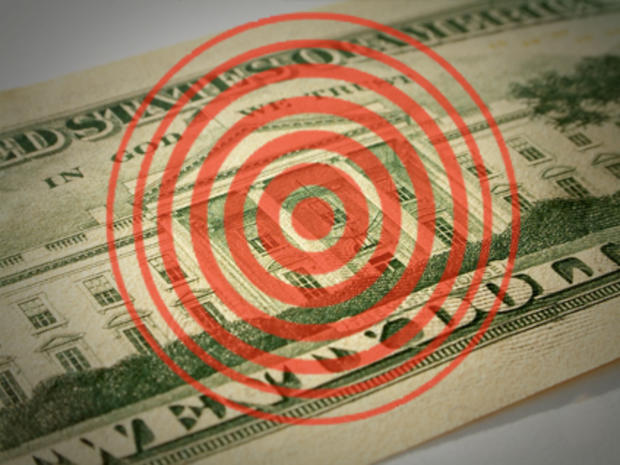Forget $38B: Budget only cuts $352 million this year
Updated at 10:45 a.m. ET
Congress today is expected to finally pass the much-debated 2011 budget bill, but the legislation won't bring about the immediate spending changes some may expect it to.
When President Obama and congressional leaders brokered a deal last week to keep the government funded for another six months, they hailed the "historic" spending cuts the deal included -- $38.5 billion in cuts from this year's budget alone.
A study from the nonpartisan Congressional Budget Office confirms that the legislation does indeed cut that much from what federal agencies are authorized to spend this year -- but the study reveals that it will only amount to a reduction of $352 million in non-war government spending for the rest of this fiscal year. That's in part because a significant portion of the cuts come from authorized funds that won't be spent immediately, such as water-and-sewer grants.
The budget makes about $8 billion in immediate cuts to domestic programs and foreign aid, but those are offset by defense spending increases. On top of that, when war funding is considered, federal spending will actually increase by $3.3 billion compared with current levels.
Additionally, as the Washington Post reports today, about $8.6 billion in the budgetary reductions come from "cutting" funds that might never have been spent in the first place. Those funds, accounting over 20 percent of the "cuts," only existed as IOUs to agencies that may or may not have been cashed in.
Video: Unlikely Sen. Rand Paul will filibuster 2011 budget vote
What's in the budget bill?
For instance, Congress allotted more than $20 million necessary to build the Capitol Visitor Center at the U.S. Capitol building. The visitor center is now completed, but the U.S. Capitol still is technically owed the rest of its budget for that project. The budget deal the House votes on today takes back $15 million from that project.
Both Democrats and Republicans told the Post that those cuts are still meaningful since the money still could have been spent somehow. Michael Steel, a spokesman for House Speaker John Boehner, said the cuts "prevent Washington bureaucrats from spending money."
The immediate reduction of $352 million in spending amounts to less than 1 percent of the $38 billion in cuts, highlighting how difficult it is to make extreme budgetary changes quickly. Some Republicans in Congress have promised to vote against the measure today because it does not cut enough quickly enough.
Rep. Jim Jordan (R-Ohio), who leads the conservative Republican Study Committee, said in a statement this week that he would not vote for the bill since the GOP originally promised to cut $100 billion from this year's budget.
"Voters are asking us to set our sights higher," he said in the statement.
If 24 or more House Republicans vote against the bill, Republicans will need to Democratic support in order to pass the budget, and many Democrats are expected to vote in favor of the measure.
A number of Democrats, however, have objected not just to the depth of the reductions in the spending bill, but also to the programs they target: The budget deal cuts $700 million from safe drinking-water programs, $390 from heating subsidies, $276 from flu-prevention programs and $390 from emergency heating assistance directed toward low-income families. It also targets the Environmental Protection Agency, which would lose $1.6 billion under the plan, and the departments of Transportation and Housing and Urban Development.
If it were to fail, the government would once again face a government shutdown.
It's on: Obama takes iron fist to GOP
Obama budget speech sets stage for 2012 debate
Obama deficit reduction plan leaves deficits
Is Social Security on the table as Obama, Congress tackle the deficit?
Today's vote represents just one element of the ongoing debate in Washington over federal spending priorities and deficit reduction. After the House votes on the 2011 budget, it will take up debate on the GOP's proposed 2012 budget, which Republicans have dubbed the "Path to Prosperity." Mr. Obama in a speech yesterday panned the GOP budget for painting a "deeply pessimistic" vision of America's future. Republicans insist deep cuts are needed in both this year's and next year's budget in order to preserve the nation's fiscal stability.
In a new Politico op-ed, Boehner argues that the 2011 deal "isn't perfect."
"But it is exactly what we need to pave the way for the 'Path to Prosperity' budget offered by Budget Committee Chairman Paul Ryan (R-Wis.), which moves the debate from cutting billions of dollars to cutting trillions," Boehner wrote. "It also cleans up the budget mess left by the last Congress -- sending a signal to job creators nationwide that we have begun to end Washington's spending binge."
Mississippi Gov. Haley Barbour, a potential 2012 GOP presidential contender, had Boehner's back at a New Hampshire event Wednesday night, the Huffington Post reports.
"I am pleased that the Congress has hit a single in the first inning on the deficit reduction that they got here as we're going along, getting a budget for this year," he said.
However, another GOP presidential contender, former Minnesota Gov. Tim Pawlenty, expressed opposition to the deal.
"The fact that billions of dollars advertised as cuts were not scheduled to be spent in any case makes this budget wholly unacceptable," Pawlenty said in a statement. "It's no surprise that President Obama and Senator Reid forced this budget, but it should be rejected. America deserves better."

